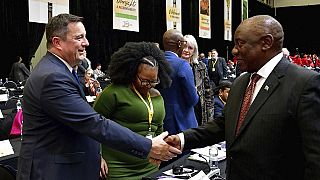South Africa
Conservationists at the recently wrapped United Nations’ Convention on International Trade in Endangered Species held in South Africa have called for renewed efforts to curb human wildlife conflict between humans and animals.
Some communities have lived near wildlife habitats for generations, but population growth and climate change are intensifying the conflicts between humans and animals.
Drought pushes lions, elephants and other wildlife closer to water and vegetation that is also a lifeline for human settlements.
In Kenya, people say they suffer from crop-raiding, damage to property and that wild life pose real danger to human life.
“It is really a problem; every year lion eat cattle here, hyenas eat sheep and sometimes goats are eaten by snakes when they are drinking water in the river. When the buffaloes migrate here to give birth, there is no grass left for our cattle to graze,”“said pastoralist John Ngula.
According to the Kenya Wildlife Service (KWS), communities are the most affected due, to their closeness to the Nairobi and Amboseli National parks.
“Due to human-wildlife conflict, people have died and animals have also died and some people also killed the wildlife. Whenever people kill wildlife, the lions and others, cheetahs, people are usually arrested. But when we lose our animals, there is no compensation. We are yet to see anybody who has ever received compensation from the government, for losing their animals or even their lives to wildlife,“said wildlife conservationist, Caroline Patita
Some of the proposals put forward by African countries at Convention include the practice of conservation hunting, which they say will curb human wildlife conflict but also deter poachers.
“When we have got an increase in animals, you end up having over abundance of certain species in certain areas, which naturally will than spill over into the communities where people are leaving. Hence the issue of human wildlife conflict. Hunting is one way of controlling those numbers because what we are doing is conservation hunting” said Zimbabwe’s Permanent Secretary, Ministry of Environment, Water and Climate in Zimbabwe, Prince Mupazviriho.
Across Africa, the battle against poaching is raging but often being lost. African elephant numbers, the numbers of African elephants, for example, fell by 20 percent between 2006 and 2015 due to a surge in ivory poaching.













01:45
How cutting off rhino horns might help curb poaching
Go to video
China establishes new global mediation organization in Hong Kong to boost international presence
01:01
AfDB downgrades Africa growth outlook but sees signs of resilience
01:45
Kenya's rhinos get their ears notched for tracking and protection
Go to video
China, U.S. agree to lower tariffs in major trade war de-escalation
Go to video
Poachers kill more than 100 rhinos in South Africa